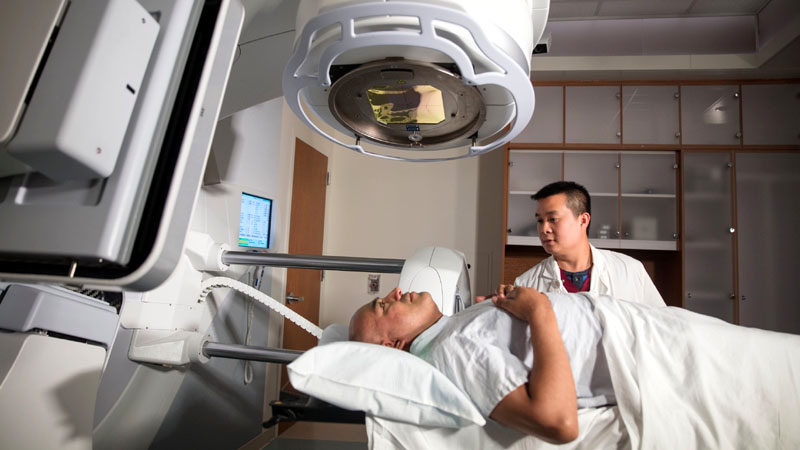![[feature] Radiation Therapy](https://blogger.googleusercontent.com/img/b/R29vZ2xl/AVvXsEg5y711ttW2gIzMvKn19gzVPkExm_MgOtKIGHVYBAs7oL61KIQNIXBmqmgQvdPEo1gycjYDnxnck4W0Tw8y5BSiGV0alICArEYCXf0PIVNVvD5ou3s2B_-g4koKOniLc9PRl3GsuD96C9J-/s1600-rw/pet.dearjulius.com.jpg)
By Sarah Lewis, PharmD, Healthgrades
1
Attacking Cancer With Radiation
Radiation therapy uses high-energy waves or particles to treat cancer and some noncancerous (benign) conditions. Radiation therapy is typically a local cancer treatment. This means it treats cancer in a specific area and doesn’t go throughout your entire body. Radiation therapy can sometimes be a systemic treatment (throughout your body) in the form of radioactive drugs or radiopharmaceuticals. Learn the details of radiation therapy, including when and how it’s used and what to expect.1
Radiation stops the rapid growth of cancer cells.
Radiation damages DNA inside cells. This prevents them from being able to grow and divide. Cancer cells are growing and dividing out of control. Radiation therapy is effective at stopping this rapid growth. Radiation therapy can also damage normal cells, but most normal cells eventually recover. The goal is to damage as many cancer cells as possible and as few normal cells as possible. This limits side effects.
2
Radiation therapy may be part of a cure or palliative therapy.
The goal of radiation therapy varies depending on the type of cancer and its stage. Radiation therapy may cure some cancers, especially in early stages. Cure means that your doctor can’t detect any cancer cells or their markers. Radiation therapy can also help ease the symptoms of advanced or terminal cancers. This is palliative therapy.
3
4
5
6
7
8
9
See more at Healthgrades
Doctors use radiation therapy alone or with other cancer treatments.
Doctors may use radiation therapy alone to treat a cancer. It can also be part of a combination treatment plan with surgery or chemotherapy. Radiation therapy can help shrink tumors and make them more manageable before other treatments. It can also make chemotherapy more effective and kill any cancer cells left from surgery. Sometimes, doctors use radiosensitizers, which are drugs that help radiation therapy work better.4
Radiation therapy can be external, internal or systemic.
The specific way it’s delivered depends on the cancer. External radiation therapy works by delivering a beam of radiation from a machine outside the body. Internal radiation—or brachytherapy—releases radiation from a sealed container inside the body. This implant releases radiation inside or near the tumor. Systemic radiation therapy delivers radiation throughout the body with a pill or injection.5
The side effects depend on the treatment location.
Radiation therapy can cause early and late side effects. Treatment location directly impacts patient symptoms. Early side effects occur during treatment. Fatigue and skin changes are common early side effects. Late side effects occur months to years after treatment and are often permanent. Ask your doctor what side effects you might expect with your treatment and how to prevent them. Prepare for treatments by arranging a ride, planning for a few days of rest, and arranging child care if necessary.6
You have to take precautions with some types of radiation therapy.
External radiation therapy does not make a person radioactive. Internal radiation therapy can make your body give off low-level radioactive energy. Body fluids and items you use won’t be radioactive. You may need to limit your time with children and pregnant women during internal radiation therapy. Systemic radiation therapy will make your body fluids and personal items, such as towels, radioactive. Ask your doctor about specific precautions with systemic radiation therapy.7
Many people continue with their normal routines during radiation therapy.
However, the side effects may make some days more difficult than others. Fortunately, some state and federal laws require employers to make adjustments in work schedules to accommodate cancer treatment. A social worker can provide guidance on your rights in this regard. You can also learn more by contacting the American Cancer Society.8
Take steps to protect your health during radiation therapy.
Protecting your health during radiation therapy is important. Since fatigue is common, take extra care to rest. You may also need to pamper your skin during treatment. Tell your doctor about changes in your skin and ask for specific skin care strategies. Washing with mild cleansers and lukewarm water may help. Ask your doctor before using lotions and other products that can leave a film on the skin. They can interfere with treatment.9
Understand the goals of your treatment and how it might affect you.
Radiation therapy comes in various forms. The way radiation therapy affects you and its possible side effects depends on how and where the radiation goes. Understanding the goals of your radiation therapy, how and when you’ll take it, and how it might affect you is key. Be proactive with your doctor. Find out how you might expect to feel and what you can do to keep yourself feeling good.See more at Healthgrades





















